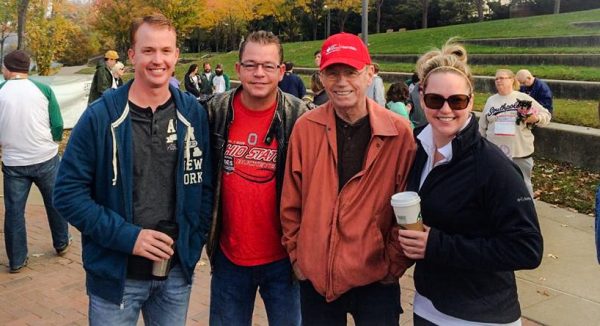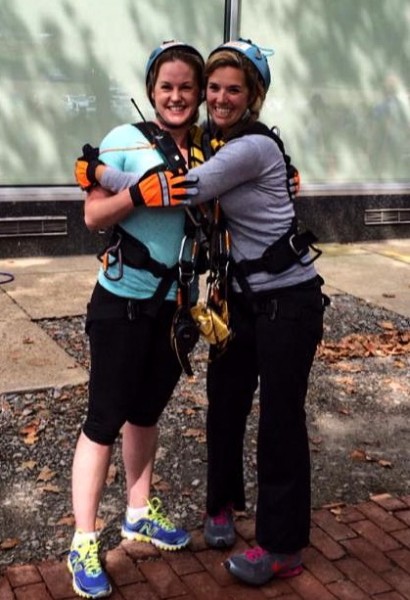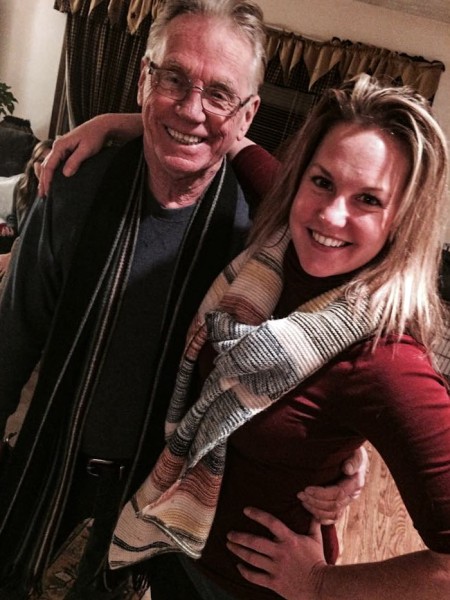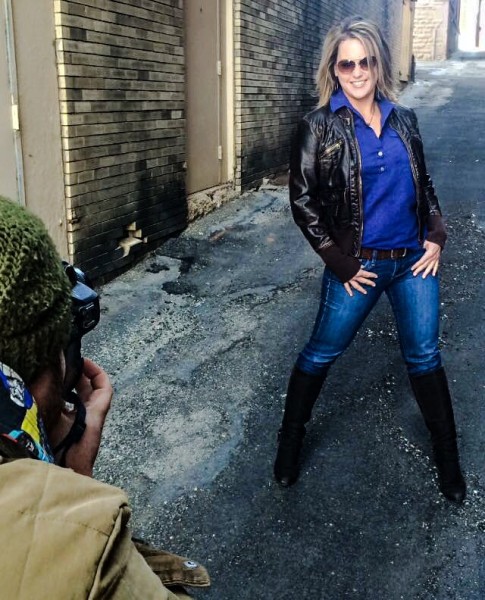She’s a believer. She’s a fighter. She’s a professional. And she’s determined.
She is Joelle Connors, a business development specialist for the Regional Economic Development Partnership (RED) in downtown Wheeling. Her focus is attracting new businesses to Ohio County, and she concentrates often on the continued rebirth of downtown Wheeling. If you have an idea and contact her, she will sit down with you and offer you a path to making that idea become a reality.
Connors will do that not only because it is her job, but also because she cares about the community in which she was raised. Connors grew in the East Ohio triangle of Tiltonsville,Yorkville, and Rayland, and downtown Wheeling was her metropolis where the tall buildings were filled with working people doing supply-and-demand business, and the small structures featured shops and restaurants and services for the thousands who commuted into the city.

And then, as a teenager, she watched the place painfully drain of the retail shops, the clothing stores, and the eateries, and no longer did it bustle with business folks as the Friendly City’s population dwindled. Connors moved away, too, after graduating from Buckeye Local High School in 1996, and West Liberty University in 2003, but Columbus, Ohio, was different from this Upper Ohio Valley. It was sterile there, and anonymous in nature. Above all, it wasn’t home.
Connors then accepted a marketing position with the city of Wheeling without knowing what to expect, and she embraced the defined duties and found herself adding to them. During her almost four-year tenure in municipal government she helped start First Fridays and worked diligently to enhance the festival season at Wheeling’s waterfront Heritage Port. She’s partnered with several others to open eyes and change attitudes, and Connors continues on that mission with RED today. The city and the region are now realizing an infusion of new and returning citizens thanks to the quality of life, employment opportunities, recreational parks and facilities, the community feel, the gas and oil industries, and the concentration on back-office businesses using the latest in technology.
And Connors is not finished. Far from it, in fact. And you get the impression when discussing her home with her that she even would shake cheerleader pom-poms along Interstate 70 if she truly believed it would help attract even more people to Wheeling.
After all, she’s done almost everything else but.
Novotney: When you accepted your current position with RED, did it feel to you as a natural progression for your career?
Connors: It did. It really did.
I had a conversation with our city manager, Bob Herron, when that opportunity came about, and I told him about it. But I didn’t just give him my notice. I wanted his input because he was a great mentor for me. I wanted his opinion.
I asked him what he thought about it. I asked him what it would mean for everyone and not just myself. I wanted to make sure the team was OK because I cared very much about what abut we were doing at the time.
And Bob said, “It’s like you were the centerfielder, and now you’re going to become the shortstop. You’ll be on the same team, but playing a different position.”
I thought that was an interesting way to look at it, and it was a natural transition.

Novotney: And now your concentration is downtown Wheeling?
Connors: Downtown Wheeling and small-business development throughout Ohio County.
RED focuses on three counties, Ohio, Marshall, and Wetzel. I have a colleague, Josh Jefferson, and his focus is small-business development in Marshall and Wetzel, so that makes me the Josh Jefferson of Ohio County.
Novotney: Since your return to Wheeling you have always expressed your belief that downtown Wheeling has potential. Why?
Conners: Because it’s the heart of our city. The downtown of any city is the heart, and that is true here. And when the downtown is thriving, then the perception is that the area, as a whole, is thriving. When a downtown is not thriving, the perception is that all the components in that area are struggling.
The reality is that all of the other components around this area are thriving, but then we have our challenges with the downtown, and that’s why there has to be that concerted focus on our downtown.
Novotney: What is the vision for downtown Wheeling?
Connors: People living downtown is huge. And we need a more walkable downtown.
That doesn’t mean our downtown is not walkable. It is. It’s just that we need to focus on one or two linear blocks at a time. Our downtown, geographically, is enormous. It’s a downtown that was built for a city of 70,000 people. That’s why we have a trolley for First Fridays. The area is too big to walk it all.
The reasons why an area like Centre Markets so well is that you can park once and you can walk to every place you need to go, door to door. So my vision is to focus on one or two linear blocks at a time, with a mix of residential, restaurants, bars, and other kinds of retail places with people living where people can live, and walk, and work, and hang out and do everything they need to do in one place.
There’s that “third place.” Where are you when you are not at home and not at work? Downtown needs to be full of “third places” so people can live, work, and have that “third place.”

Novotney: Does that revitalization call for people first?
Connors: It depends on whom you ask.
When I went to the National Main Street Conference, this was a topic of discussion for everyone, and that tells me this is a conversation that cities like ours have nationally. Which comes first? Do you bring the people first, or do you bring the amenities first? Each city that you ask has a different answer and a different solution, so I think you have to look at what works best in your market.
In Wheeling, I think both things have to happen simultaneously. For example, RED just announced that there is going to be housing on the top three floors of the Stone Center. Simultaneously, there’s someone working on a restaurant/bar (Another World) right across the street. Those developments are happening at the same time, and it’s perfect. So that block is the next focus area.
I used to get calls from people who wanted to start restaurants, bars or breweries, and almost everyone wanted to be in Centre Market. Now that conversation is shifting. What’s happening now is that those same kinds of start-ups call me frequently, and they say they want to be in the downtown. They think Centre Market is doing well, and they want to focus on another area so the entrepreneurs themselves are saying, “That’s where we want to be now. That’s the next focus area.”
So I really believe it’s all supposed to happen at the same time.
Novotney: For the past several years a lot of people who have been making efforts to attract more people to live in the downtown have said, “We just need that one big thing to happen.” This new housing project in the Stone Center is a pretty big thing, is it not?
Connors: It is, and we have seen a lot of “little big things” take place, and it dates back to when Orrick chose Wheeling, and it has continued since.
Our largest building in the downtown is the Wheeling-Pittsburgh Steel Building, and it is now empty. However, every one of those jobs has now been replaced by all of the employment inside the Stone Center. One day there were probably more than 500 people working in the steel building, and now there are more than 500 jobs inside the Stone Center. And we’re not done yet.
It represents a shift in the economy, and that’s fine.

Novotney: Why did Joelle Connors choose Wheeling when you could have found employment anywhere in the country?
Connors: It’s home. Wheeling is home. It feels like home.
When I was living in Columbus, every time I came back here for a weekend, there always was this nagging, inner monologue: “Why don’t I live here again?”
Columbus is a fine city, but it’s a very transient city. No one is from Columbus. People don’t make personal connections. My co-workers never wanted a personal connection with their other co-workers. Nobody wanted to know about your family. Nobody wanted to have anything to do with you other than you were there for work.
In Wheeling, it’s not like that. You could meet someone randomly at the grocery store, and three years later that person could be a good friend of yours. That’s possible here. That’s how Wheeling works.
We are friendly, and it just feels like home. You can have your piece of the American Dream here. It’s a little more achievable here. Home ownership, your quality of life is enhanced, and the commute to work is a far better experience here than it is in other areas. All those things make a big difference. When I lived in Columbus, I lived five miles away from work, and it took me 45 minutes to get there. In Wheeling, my commute to work take 10 minutes, and that’s with snow and traffic.
Novotney: “First Fridays” is a great example your tenacity, persistence, and belief. Tell me about that.
Connors: Well, definitely tenacity.
It took a lot to get it going, and Olivia Litman has taken it and has run with it, and she’s done an amazing job with it. It didn’t matter if it was February and it was snowing – her attitude was that we’re going to do it anyway. That’s what it took.
The way it is now is exactly how we envisioned it when we started it, so it’s really cool to see it now. And it’s really cool when you overhear people you do not know talking about it. That lets you know that it’s working. It lets you know that the people are getting it now. That’s a really cool thing.
It’s an example of how community development and economic development intersect. That is exactly what is supposed to happen. We now have groups like ReInvent Wheeling that are working on community development and groups like RED that are working on economic development. That’s the perfect marriage, and it works.

Novotney: What’s the next big thing that will happen in Wheeling?
Connors: It’s already happening, and that’s the shift to the downtown in terms of live, work, play. It’s not going to happen; it is happening.
I’m excited to see what downtown Wheeling looks like in five years. There’s such a renewed spirit, and there have been a lot of people working very hard over the last past 10 years for that to be there today, so it makes us very happy to hear people talking about it today.
Novotney: I am a big believer that the turning point for downtown Wheeling was reached on April 3, 2009, when the Wheeling Convention and Visitors Bureau purchased the Capitol Theatre because it took a lot of people to come together to make that happen and because it allowed people to believe it was possible. Do you agree?
Connors: I do agree, and I also think that it led to a change in attitude. I think people realized that when everybody wins, everybody does win, and that’s made a huge difference with the development that has taken place since.
Novotney: What’s next for Joelle Connors?
Connors: I plan to continue working with the team at RED so we can continue doing everything we can for this city.
But I’m in Wheeling forever. I like to travel, and that’s fine because I can travel and then come home. I like it here. I really, really like it here.



